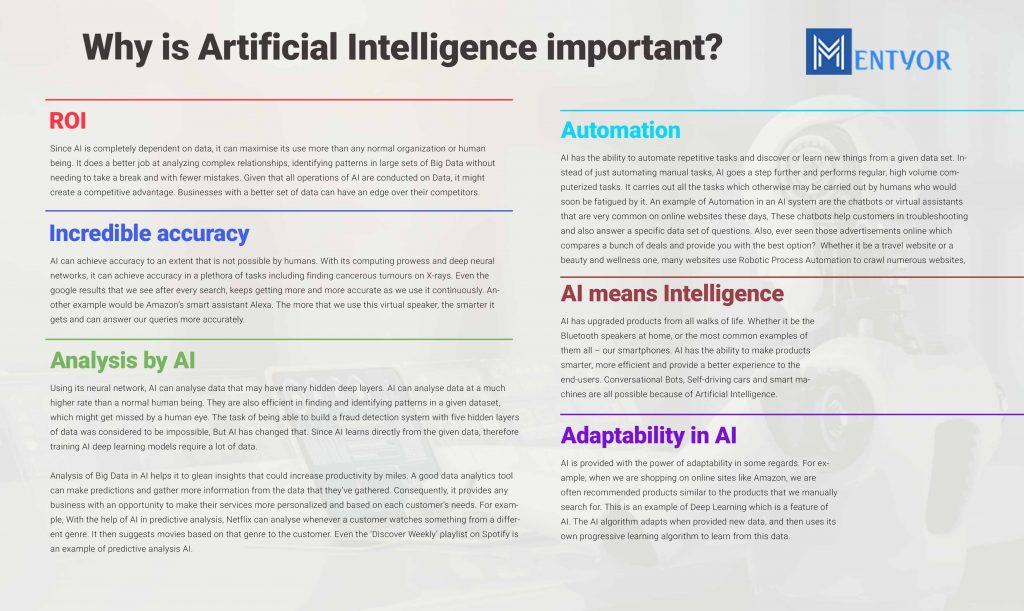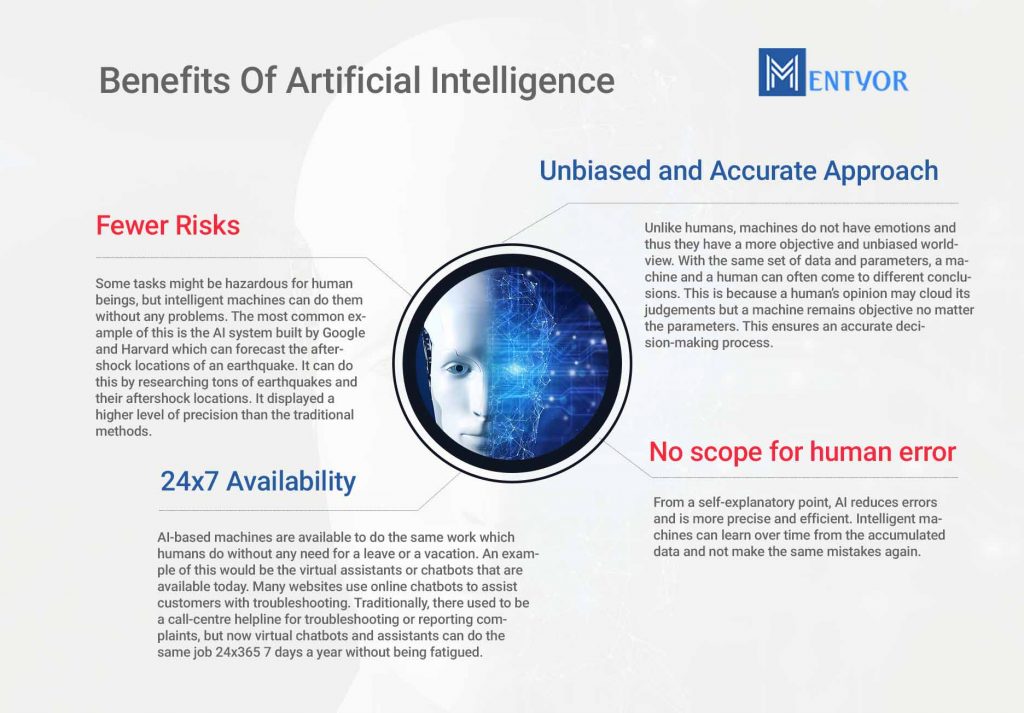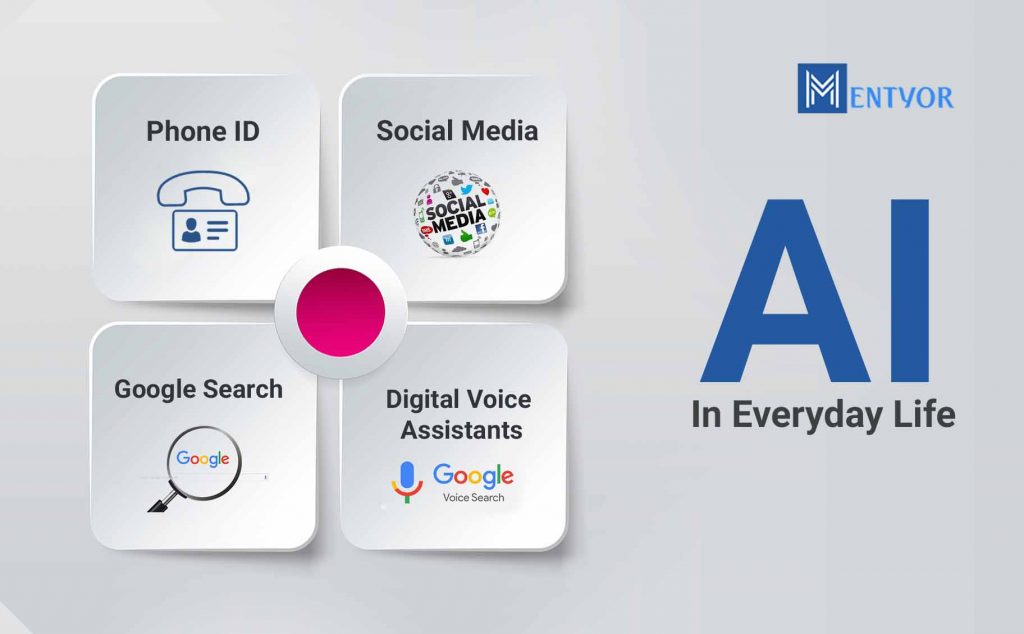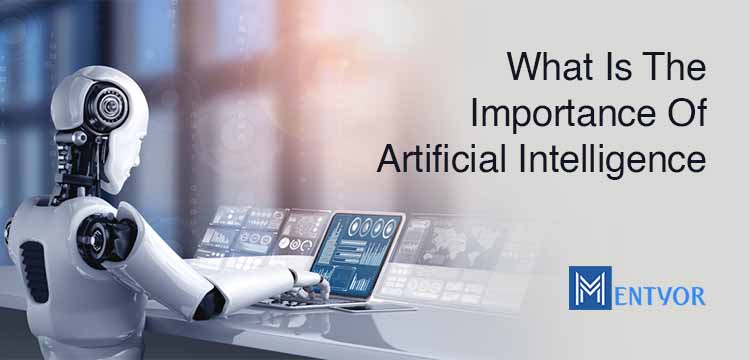Artificial Intelligence or popularly known as AI has transformed the world into the fast-paced world that it is today. Whether it be using the GPS in our day to day lives or using social media, or whether something complicated such as robotic surgeries, imprints of AI can be found everywhere.
It is being integrated into our day-to-day lives in the most ordinary and unsuspecting ways possible. As such the immense importance of Artificial Intelligence is undeniable.
In 2019 alone, the machine learning application industry, a branch of artificial intelligence and data science, had received $37 billion of funding in the United States. [1] And by 2030, it is predicted that this industry will contribute $15.7 Trillion or a 26% increase in the global GDP. These statistics are enough to prove that the importance of AI is only going to grow.
The one field where AI has made immense improvements is that of the medical industry. It has managed to improve life expectancy and quality of life by leaps and bounds. But one important factor to note is that the AI that is available to us today is only just the tip of an iceberg. So read on as we tell you more about the importance of AI in our day-to-day lives.
Read more about Artificial Intelligence: What Is Artificial Intelligence?
What Is the Importance Of Artificial Intelligence?
Before we begin to delve further into what is Artificial Intelligence, let us understand what artificial intelligence actually stands for. According to John McCarthy, one of the founding fathers of the discipline of AI, “It is the science and engineering of making intelligent machines, especially intelligent computer programs. It is related to the similar task of using computers to understand human intelligence, but AI does not have to confine itself to methods that are biologically observable.”[2]
To put it simply, it refers to providing computing machines with the ability to impersonate human intelligence and their decision-making capabilities. Basically making computers think like humans. Or maybe even become something better.
Why is Artificial Intelligence important?
It aims to automate the jobs that human beings perform but in a much more efficient way. Currently, we have two types of AI systems: Reactive Machines and Limited Memory. The former does not have the ability to learn while the latter does. Reactive Machines are the ones having AI which are simply capable of providing a particular output to a specific input. For example, A reactive machine which is made for playing chess would be splendid at it.
But if we were to ask this machine to play tic tac toe, it wouldn’t be able to. Limited memory machines, on the other hand, use AI that is capable of “learning”. This is predominantly used in our world.
Whether it is Siri or Alexa, or the myriad of “filters” that are trending on Social Media like Instagram – everything is a product of AI. Various factors are involved in making Artificial Intelligence so special. We list down a few of those factors below:

Automation:
AI has the ability to automate repetitive tasks and discover or learn new things from a given data set. Instead of just automating manual tasks, It goes a step further and performs regular, high volume computerized tasks. It carries out all the tasks which otherwise may be carried out by humans who would soon be fatigued by it. An example of Automation in an AI system are the chatbots or virtual assistants that are very common on online websites these days, These chatbots help customers in troubleshooting and also answer a specific data set of questions.
Also, ever seen those advertisements online which compares a bunch of deals and provide you with the best option? Whether it be a travel website or a beauty and wellness one, many websites use Robotic Process Automation to crawl numerous websites, compare data from each website and then provide the best deal.
AI means Intelligence
It has upgraded products from all walks of life. Whether it be the Bluetooth speakers at home, or the most common examples of them all – our smartphones. It has the ability to make products smarter, more efficient and provide a better experience to the end-users. Conversational Bots, Self-driving cars and smart machines are all possible because of Artificial Intelligence.
Read about Amazing Data Science Application: A Digital World: 12 Amazing Data Science Applications
Adaptability in AI
It is provided with the power of adaptability in some regards. For example, when we are shopping on online sites like Amazon, we are often recommended products similar to the products that we manually search for. This is an example of Deep Learning which is a feature of AI. The AI algorithm adapts when provided new data, and then uses its own progressive learning algorithm to learn from this data.
Analysis by AI
Using its neural network, It can analyze data that may have many hidden deep layers. It can analyze data at a much higher rate than a normal human being. They are also efficient in finding and identifying patterns in a given dataset, which might get missed by a human eye. The task of being able to build a fraud detection system with five hidden layers of data was considered to be impossible, But it has changed that. Since it learns directly from the given data, therefore training AI deep learning models require a lot of data.
Analysis of Big Data in AI helps it to glean insights that could increase productivity by miles. A good data analytics tool can make predictions and gather more information from the data that they’ve gathered. Consequently, it provides any business with an opportunity to make their services more personalized and based on each customer’s needs. For example, With the help Artificial Intelligence in predictive analysis, Netflix can analyze whenever a customer watches something from a different genre. It then suggests movies based on that genre to the customer. Even the ‘Discover Weekly’ playlist on Spotify is an example of predictive analysis Artificial Intelligence.
Incredible accuracy
AI can achieve accuracy to an extent that is not possible by humans. With its computing prowess and deep neural networks, it can achieve accuracy in a plethora of tasks including finding cancerous tumours on X-rays. Even the google results that we see after every search, keeps getting more and more accurate as we use it continuously. Another example would be Amazon’s smart assistant Alexa. The more that we use this virtual speaker, the smarter it gets and can answer our queries more accurately.
ROI
Since it is completely dependent on data, it can maximize its use more than any normal organization or human being. It does a better job at analyzing complex relationships, identifying patterns in large sets of Big Data without needing to take a break and with fewer mistakes. Given that all operations are conducted on Data, it might create a competitive advantage. Businesses with a better set of data can have an edge over their competitors.
Benefits Of Artificial Intelligence

Unbiased and Accurate Approach
Unlike humans, machines do not have emotions and thus they have a more objective and unbiased worldview. With the same set of data and parameters, a machine and a human can often come to different conclusions. This is because a human’s opinion may cloud its judgements but a machine remains objective no matter the parameters. This ensures an accurate decision-making process.
No scope for human error
From a self-explanatory point, It reduces errors and is more precise and efficient. Intelligent machines can learn over time from the accumulated data and not make the same mistakes again.
24×7 Availability
AI-based machines are available to do the same work which humans do without any need for a leave or a vacation. An example of this would be the virtual assistants or chatbots that are available today. Many websites use online chatbots to assist customers with troubleshooting. Traditionally, there used to be a call-centre helpline for troubleshooting or reporting complaints, but now virtual chatbots and assistants can do the same job 24×7 365 days a year without being fatigued.
Fewer Risks
Some tasks might be hazardous for human beings, but intelligent machines can do them without any problems. The most common example of this is the AI system built by Google and Harvard which can forecast the aftershock locations of an earthquake. It can do this by researching tons of earthquakes and their aftershock locations. It displayed a higher level of precision than the traditional methods.
Know why Data Science Jobs are in Demand: Top 9 Reasons Why Data Science Jobs Are In Demand
AI In Everyday Life

It has become an indispensable part of our everyday lives. For the uninitiated, Artificial Intelligence may seem like it only applies to tech giants or big corporations, but in reality, we are making use of AI every day. Some examples are:
Phone ID:
The facial recognition feature that most of us use on our smartphones to unlock it is a brainchild of AI. Almost all smartphones have this feature now, but the pioneer is for sure – Apple. The FaceID feature on iPhones can see in 3D. It lights up your face and then places 30,000 invisible infrared dots on it to capture an image.
It then runs it by its machine-learning algorithm to match this scanned image with the image that it has stored previously with your information. This is to verify whether the person unlocking the phone is actually you. And all this is done only in a fraction of seconds! According to Apple, the chances of fooling FaceID is one in a million. [3]
Social Media
With the world becoming tech-savvy, social media is the no.1 hangout place for millions of people in the world. From its most popular features of suggesting new friends, automated fun and interactive filters to click pictures with, or even tagging people on your pictures – everything is AI-based. Machine learning algorithms play a huge part in the workings of social media and make it more personalised for each user.
Read Blog about Integration of Data Science and Social media: Digital World: The Integration Of Data Science And Social Media
Google Search
Each time that we do not know an answer to a question, we automatically say “Google It”. The search engine giant relies heavily on machine learning and Artificial Intelligence. From search results to the Ads that we see on Google and the related websites, all of them use Artificial Intelligence.
Digital Voice Assistants
From Google’s Siri to Amazon’s Alexa, these digital voice assistants can help you set your alarms to even switch the home security system at your house. In 2020, there were 4.2 billion digital voice assistants in use worldwide. [1]
The digital assistants use Natural Language Processing and AI generators to answer back to your queries.
Conclusion
The AI that we have available right now is only just the tip of the iceberg. With numerous researches being conducted worldwide in the development of Artificial Intelligence, machines are only going to get smarter. The importance of it in everyday applications proves how efficient it is.
Artificial Intelligence has endless potential and although the technology naysayers may fear the end of humanity by Artificial Intelligence, ultimately it is up to humans to decide how they wish to implement this in their lives.
References
[1] Todorov, G. (2021, February 26). 65 Artificial Intelligence Statistics for 2021 and Beyond. Semrush Blog. https://www.semrush.com/blog/artificial-intelligence-stats/#general-artificial-intelligence-statistics
[2] McCarthy, J. (2012). What is AI? / Basic Questions. Stanford. http://jmc.stanford.edu/artificial-intelligence/what-is-ai/index.html
[3] Hollister, S. (2017, September 20). iPhone X: How Face ID works. CNET. https://www.cnet.com/tech/mobile/apple-face-id-truedepth-how-it-works/


 WhatsApp
WhatsApp